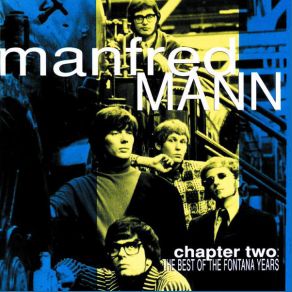Chapter Two: The Best of the Fontana Years
Download links and information about Chapter Two: The Best of the Fontana Years. This album was released in 1994 and it belongs to Rock, Pop genres. It contains 20 tracks with total duration of 56:36 minutes.

|
|
|---|---|
| Release date: | 1994 |
| Genre: | Rock, Pop |
| Tracks: | 20 |
| Duration: | 56:36 |
| Buy it NOW at: | |
| Buy on iTunes $9.99 | |
Tracks
[Edit]| No. | Title | Length |
|---|---|---|
| 1. | Just Like a Woman (Mono Version) (Manfred Mann) | 2:54 |
| 2. | I Wanna Be Rich (Manfred Mann) | 2:32 |
| 3. | Trouble and Tea (Manfred Mann) | 2:12 |
| 4. | Box Office Draw (Manfred Mann) | 2:14 |
| 5. | Each Other's Company (Manfred Mann) | 2:53 |
| 6. | Semi-Detached Suburban Mr. James (Mono Version) (Manfred Mann) | 2:39 |
| 7. | Each and Every Day (Manfred Mann) | 2:54 |
| 8. | Ha! Ha! Said the Clown (Mono Version) (Manfred Mann) | 2:27 |
| 9. | So Long Dad (Manfred Mann) | 3:00 |
| 10. | The Mighty Quinn (Quinn the Eskimo) (Manfred Mann) | 2:53 |
| 11. | It's So Easy Falling (Manfred Mann) | 3:26 |
| 12. | No Better, No Worse (Manfred Mann) | 3:07 |
| 13. | Everyday Another Hair Turns Grey (Manfred Mann) | 2:59 |
| 14. | Cubist Town (Manfred Mann) | 3:23 |
| 15. | Up The Junction (Mono Single) (Manfred Mann) | 3:40 |
| 16. | Sing Songs Of Love (Manfred Mann) | 2:03 |
| 17. | My Name Is Jack (Mono Version) (Manfred Mann) | 2:55 |
| 18. | Fox on the Run (Manfred Mann) | 2:47 |
| 19. | Ragamuffin Man (Manfred Mann) | 3:11 |
| 20. | Funniest Gig (Manfred Mann) | 2:27 |
Details
[Edit]The departure of Paul Jones for a solo career in 1966 spelled major reorganization for Manfred and his troops, who recruited lead vocalist Mike D'Abo and bassist (and Beatle chum) Klaus Voormann. To the surprise of many, the new lineup rattled off seven Top Ten British hits in the next three years in a far less R&B-oriented style. Emphasizing harmonies and Manfred Mann's inventiveness as arranger and keyboardist (often employing the then-futuristic Mellotron), this represented the group's most commercial phase, with an upbeat approach that bordered on downright chipper. These 20 tracks include all the key singles from this time, as well as a few LP cuts. Frankly, this rather lightweight, prototypically cheery late-'60s British pop — sounding rather like a more commercial version of the Odessey & Oracle-era Zombies — hasn't aged nearly as well as their far gutsier Paul Jones-era recordings. Only one of these songs was a hit in the U.S., but it was a big one: their great 1968 arrangement of the then-unreleased Bob Dylan song "The Mighty Quinn."